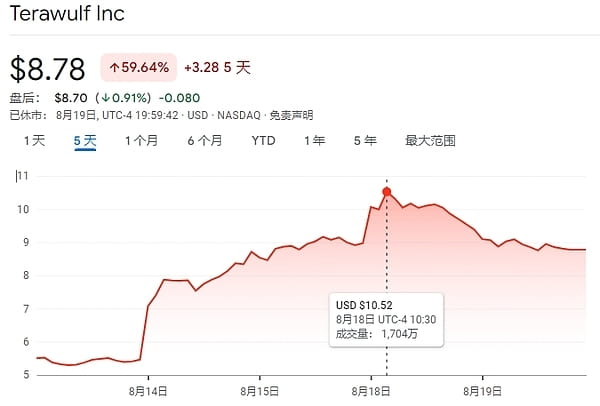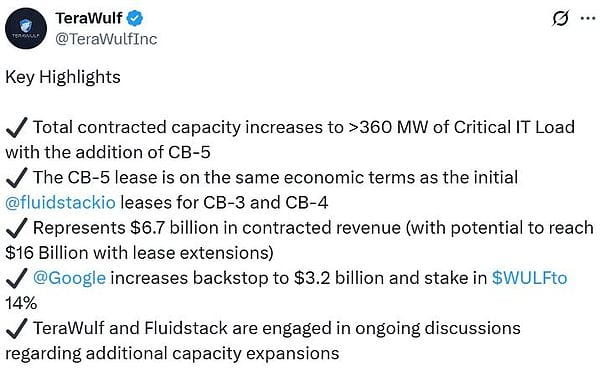Deng Tong, Golden Finance
On August 14, 2025, Google announced its investment of $3.7 billion to acquire an 8% stake in the Bitcoin mining company TeraWulf. On August 18, TeraWulf announced that it would increase its convertible bond sale to $850 million, expecting the net proceeds from this transaction to be $828.7 million. Buyers have a 13-day option to add $150 million to the transaction, which is expected to be completed this week. Google currently holds warrants for 14% of the company’s shares.
Following positive news, TeraWulf's stock price has been on an upward trend since August 14, reaching a high of $10.52 on August 18, up $5.22 from the low of $5.30 on August 13, an increase of 98.49%. It has since dipped slightly, closing at $8.78 as of publication, still maintaining a high level.

1. Overview of TeraWulf's Collaboration Plan with Google
Last Thursday, TeraWulf announced at its shareholder meeting that it had signed a 10-year hosting lease agreement with AI infrastructure provider Fluidstack, with total contract revenue amounting to $3.7 billion. If renewed for five years, this figure could more than double.
Google's involvement includes supporting Fluidstack with TeraWulf's $1.8 billion leasing obligations and providing debt financing. In return, Google received warrants for approximately 41 million shares of TeraWulf stock, representing about 8% of the company.
This week, Google continued to increase its stake in TeraWulf. TeraWulf's Chief Strategy Officer Kerri Langlais revealed that the amount of support from Google in this agreement has now risen to $3.2 billion in exchange for warrants to purchase over 73 million shares of TeraWulf, accounting for 14% of the company. Google’s new equity makes it TeraWulf's largest shareholder, which "demonstrates strong recognition from one of the world's leading technology companies" and highlights "the strength of our zero-carbon infrastructure and the scale of future opportunities."

This collaboration will provide TeraWulf's Lake Mariner data center in western New York with over 200 MW of critical IT load (total capacity of about 250 MW), specifically designed for liquid-cooled AI workloads. TeraWulf's Lake Mariner facility is equipped with dual 345 kV transmission lines, a closed-loop water cooling system, and low-latency fiber optic connections, aiming to become a top-tier hyperscale data center that meets the demands of high-performance AI workloads. The first phase of this facility's deployment will deliver 40 MW of capacity, expected to come online in the first half of 2026, with full completion expected by the end of the year.
TeraWulf CEO Paul Prager called this TeraWulf's "definitive moment," while CTO Nazar Khan emphasized the facility's scalability and readiness.
Fluidstack President César Maklary emphasized the mutual commitment to fast, scalable AI infrastructure.
2. Moving Towards HPC Hosting Business
TeraWulf, established in 2021, is a Bitcoin mining company focused on environmentally sustainable operations.
According to the Q2 2025 performance report released by TeraWulf on August 8, the revenue for Q2 2025 was $47.6 million, compared to $35.6 million in Q2 2024; BTC mining capability increased by 45.5% year-on-year to 12.8 EH/s. In Q2 2025, the company mined 485 Bitcoins through Lake Mariner, down from 699 Bitcoins in Q2 2024. The decrease in mining quantity was mainly due to two reasons: the halving in April 2024 and the strategic divestment of the Nautilus Cryptomine facility in October 2024. The power cost per Bitcoin in Q2 2025 was $45,555, compared to $22,954 in Q2 2024, reflecting the halving, increased network difficulty, and short-term fluctuations in electricity prices.
Since the Bitcoin halving, miners have been seeking to diversify their revenue streams by shifting energy capacity towards AI and high-performance computing (HPC) hosting services. TeraWulf also faces the common challenges that Bitcoin mining companies face, and whether to make a change is a question TeraWulf must consider.
Asset management firm VanEck estimated in an August 2024 report that if publicly traded Bitcoin mining companies transfer 20% of their energy capacity to AI and high-performance computing (HPC) by 2027, they could add an additional $13.9 billion in profits annually over 13 years.
"In the short term, mining can generate cash flow and provide valuable resources to the grid, as its flexible load can quickly adjust to support stability and reliability." However, in the medium to long term, TeraWulf believes that converting the business to AI and high-performance computing workloads "holds greater value," with long-term contract revenues signed with blue-chip partners such as Fluidstack and Google expected to "drive growth and value creation."
TeraWulf CFO Patrick Fleury noted, "We will begin to recognize revenue from our high-performance computing (HPC) hosting business in the third quarter of 2025, marking a key turning point in our financial situation. With the implementation of our previously announced financing strategy and a rigorous capital allocation approach, we are confident in achieving expansion responsibly while creating meaningful value for shareholders."
TeraWulf CEO Paul Prager stated, "TeraWulf continues to execute its strategy of developing scalable and sustainable digital infrastructure to support high-performance computing (HPC) hosting and proprietary Bitcoin mining." "In the second quarter, we made significant progress in delivering the 72.5 MW HPC capacity required under the Core42 contract. The company delivered the WULF Den data center in July and began generating profits, and is expected to deliver the CB-1 data center this month to generate revenue, with the CB-2 data center to follow in the fourth quarter, in line with previous expectations. At the same time, we are engaged in in-depth discussions to expand the HPC hosting deployment at Lake Mariner and are actively seeking more data centers to support our long-term growth plans."
3. Why Did Google Invest in TeraWulf?
1. There is money to be made
As previously mentioned, TeraWulf has signed a 10-year hosting lease agreement with AI infrastructure provider Fluidstack, with total contract revenue amounting to $3.7 billion. If renewed for five years, this figure could more than double. The agreement employs a modified total lease agreement with annual increments, and the expected net operating profit margin at the site level is projected to reach 85%, amounting to approximately $315 million per year. The total project cost is expected to be $8 to $10 million per MW.
The increase in TeraWulf's stock price also shows the market's recognition of the value of the collaboration between TeraWulf and Google—after Google's announcement of investment, TeraWulf's stock price surged nearly 100% in the short term. As the Lake Mariner data center comes online in 2026 and the scale of the HPC hosting business expands, the company's revenue and profit growth will further elevate equity value, with Google as the largest shareholder able to share in the profits directly.
2. Supporting Google's AI Competition
Google has made remarkable progress in the AI competition, with the Gemini series of models achieving notable successes, and Gemini 2.5 Pro sweeping multiple categories on the LMArena leaderboard, including code, mathematics, and science. The development of AI relies heavily on HPC. HPC serves as the computing backbone, providing core support for the development of AI and big data, acting as the "engine" of AI development. During the training phase, large AI models need to process billions or even trillions of parameters, which cannot be accomplished by ordinary servers alone. HPC can significantly shorten model training cycles through clustered architecture and parallel computing technology; during the inference phase, real-time AI applications require low-latency responses, and HPC's high-speed interconnect technology and edge computing node deployment ensure that AI models can complete inference decisions within milliseconds.
In an interview with CNBC, TeraWulf CEO Paul Prager pointed out, "The collaboration with Google is a definitive moment for TeraWulf. We are uniting world-class capital and computing partners to build the next generation of AI infrastructure, powered by the lowest cost and nearly zero-carbon energy in the industry. The Lake Mariner site is very unique. It has dual 345 kV power transmission lines, a closed-loop water cooling system, and a low-latency fiber optic network. These conditions are tailor-made for liquid cooling and high-density AI computing."
Currently, TeraWulf has shifted from Bitcoin mining to HPC hosting, planning to deliver multiple data center capacities. TeraWulf will assist Google in its AI competition in the future.
4. Conclusion
The deep bond between Google and TeraWulf represents a win-win collaboration. TeraWulf leverages Google's funding and reputation to achieve a short-term increase in stock prices, while in the medium to long term, it can expand from a single mining pathway to HPC hosting services and AI infrastructure development, finding new profit points. Meanwhile, Google can obtain more computing resources through its investment in TeraWulf to meet its computing needs for large model training and cloud services, and benefit from equity appreciation returns from TeraWulf's profits.
As competition in the AI space heats up, TeraWulf's development trajectory serves as a transformation model for more cryptocurrency mining companies—hitching a ride with technology giants to enter a golden path, while leveraging its existing business as a basic support, actively expanding into high-value-added businesses, and becoming a bridge for the collaborative development of the traditional technology and cryptocurrency industries.

